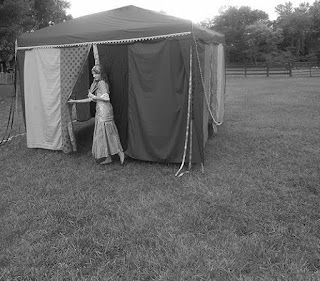The Catholic Fiction Problem is a Marketing Problem (2005)
I wrote this post on Jim Manney's blog in 2005, and later presented this article as a talk at the Catholic Marketing Network's Catholic Writer's Conference Live. It's a little dated by now, but I believe it still has some good insights regarding the general problems with marketing fiction to Catholics.
This past semester I taught a short course in fiction writing at Christendom College, and this past week's class I gave them an overview of the secular and the Catholic publishing industry, particularly looking at the reasons why more Catholic fiction isn't being published by the more well-known Catholic publishers. I drew on my own experience as a freelance writer who occasionally reviewed Catholic fiction (I no longer write reviews on any regular basis) and my work as a Catholic author dealing with two different publishing houses. But also enlightening has been attending the annual Catholic Marketing Network Trade Shows with my husband, who owns a web design company, where I had a chance to see how Catholic marketing works in practice, as well as talking with bookstore owners and publishers whose daily work involves selling Catholic books.
My surmisal of why Catholic authors can't get Catholic publishers to publish their novels comes down, in the end, to the problem of the buying habits of Catholics.
First of all, many Catholics do not go to Catholic bookstores or websites at all, nor do they read Catholic papers or magazines. Thus they are "unreachable" by advertising in Catholic publications or in stores. Let's set aside these Catholics (and the enormous problem they represent) for now and talk about the Catholics who do actually go to Catholic bookstores, websites, and read Catholic publications -- both those who visit a Catholic bookstore twice in their lives and those who subscribe to several magazines and papers and regularly order from Catholic catalogs.
These Catholics go to specifically Catholic outlets such as bookstores, and now, to a smaller degree, websites, for two main reasons: gifts and catechetical materials. The bulk of what you see at the CMN trade shows reflects this: rows of statues, knicknacks, gifts for First Communions and Baptisms, and books on theology, the saints, catechetics, apologetics - books that enable the buyers to either educate themselves or others (ie: their children or relatives' children) about the faith. Catholics simply do not go to Catholic outlets to find entertainment. If they want to be entertained, they turn on the TV, go to Blockbuster or Barnes and Noble or Amazon.
This is one reason why Catholic writers of quality and ambition invariably end up publishing with secular companies, not Catholic ones. However, I will note that in general, the Catholic authors who do publish successfully in the secular world do not necessarily succeed because they are reaching a Catholic audience. Their works may be faith-filled witnesses to the Catholic faith in subtle or bold ways, but these authors are successful because their works strike a chord in Protestants, Jews, the unchurched, and people of other faiths - NOT because they are reaching a Catholic audience who is eagerly identifying themselves with the Catholic author's faith. Thus Catholics can be surprised to learn that authors like J.R.R. Tolkien in the past and Patrick O'Brien today (author of Master and Commander) are Catholics.
So, thus far, the marketing connection of Catholic authors with a Catholic readership has still not been made to the extent where it has significantly impacted the buying patterns of Catholics. This is the hurdle that every Catholic publisher faces who considers publishing a Catholic fiction book. The majority of their audience is not looking for this product, is not aware that they need this product, and is not even aware that this product exists. Until something happens to significantly change the buying habits of the average Catholic-book-buying Catholic, Catholic fiction will remain a nonentity in the publishing world.
But there are signs that this is changing. The main engine of change is what I call the need for a subculture.
While there are other forces that drive Catholics to search for a subculture, we can't ignore the influences of the Protestant evangelical subculture on your average Catholic. The influences here range from the impact of homeschooling (formerly a Protestant phenomenon but now a strong Catholic movement) to the influx of Protestant converts into the Church to the friendly relations between Catholics and evangelical Protestants since Vatican II. Many of these influences result in Catholics borrowing or buying Christian products such as fiction novels or music CDs, but the main result of this influence is that many Catholics are starting to desire a Catholic or Christian subculture, analogous to the Christian evangelical subculture that already exists, a subculture with its own educational materials, music, tv channels, fiction novels, video games, and even movies.
There is also the growing perception among Catholics that mainstream values and culture are becoming increasingly amoral and sometimes anti-Catholic, which in many cases causes them to try to create or search for alternative forms of culture. Enough has been written on this phenomenon that I think I don't need to explain it further.
Whether Catholics desire a subculture because they are traditionalist Catholics longing for a 1950's style Catholicism or simply parents concerned about the debasement and obscenity in their children's entertainment, the fact remains that a steadily growing number of Catholics, especially Catholic parents, are searching for alternative culture and are putting their money towards creating one. And this subculture that is being created through their buying choices does include (or will include) entertainment.
At the Catholic Marketing Network, you can already identify products that are take-offs of similar products in the evangelical market. For example, vacation bible school curriculums for Catholics are being produced based on Christian models. The "K4J" (Kids for Jesus) clubs for middle-school children produced by Regnum Christi also remind one of similar Protestant clubs. As the main thrust of most Catholic publishing is education (I'm here including the behemoth companies that produce Catholic religious texts for schools, now mostly secular/Catholic conglamorates as well as smaller but still large companies like Our Sunday Visitor whose mission is to publish materials to inform Catholics about their faith), it's natural that the first alternative "subculture" products that have found publishers and marketing outlets are educational in nature.
But just as the Protestant presses that started out publishing Bibles and Bible studies in the 60's and 70's are now publishing several diverse branches of Christian fiction, it's possible, maybe even probable that as the Catholic subculture grows, it will expand to include entertainment. In fact, this is happening already, as the number of self-published Catholic fiction books and small publishing houses of Catholic fiction continues to grow, and as Catholic bookstores start to carry evangelical products such as video games and movies in their stores (you can find sellers of both at the CMN shows).
Still, the fact remains that as of yet, the desire for a purely Catholic entertainment on the part of the Catholic consumer has not yet emerged as a significant marketing force.
For the Catholic novelist, the first step is, I think, to correctly identify the problem. The problem is not with Puritanical or backward-thinking Catholic publishers or even with badly-written novels -- the problem is at its core an audience problem. The problem is a marketing problem, and in order to solve it, Catholic writers need to think like marketers, not having the leisure to merely think exclusively like artists. (Of course, there is the chance that too much thinking about marketing will make them lose sight of their art, but that's a balance the Catholic writer who wants to succeed in this market will have to negotiate.)
I also point out to my students that if the goal of creating an artistic Catholic subculture is to succeed, we don't merely need good writers, but good fiction editors, good agents, good marketers - people who are working at every level to create quality Catholic fiction with compelling storylines and literary quality. I have told my students in my fiction writing classes that if they are fascinated with fiction but can't write it themselves, God might want them to learn about fiction in order to work with others who can write it. A joint cooperation between publishers, editors, and writers - and marketers! -- is desperately needed.
The marketing realities of the problem include the fact I mentioned at the beginnning, that too many Catholics are unreachable with conventional Catholic advertising. I have a hunch that the only way to reach them is through the parishes and through the Catholic school system, but that of course, involves its own problems, which are beyond the scope of this article. But brainstorming in this area might be wise.
I would say that since Catholics currently buy books as gifts and to educate themselves and others, a fruitful approach might be to write a Catholic fiction series aimed at Catholic teens. As a young adult fiction writer myself, I know that Catholic parents are always looking for good books to give to their teens and pre-teens, and they recognize that fiction is an ideal way to do this, since teens resent 'preachiness.' A novel that can present the faith with subtlety, ingrained in the storyline without subverting the story for merely catechetical purposes might succeed with them. This was my rationale for creating the John Paul 2 High series.
Editing the series, which means that I need to work with the artists (the writers) as well as the marketers (the publishers) means that I've had to strike a balance between the two. On the one hand, I have to focus on getting the writers to simply tell a good story and tell it well and consistently, crossing out parts that are too preachy and trying to embed the messages in the actions of the characters. On the other hand, I have to keep giving the publishers ideas on how they can market this series to parents and educators as a way of helping to keep their kids Catholic. It can make a person feel schizophrenic at the worst of times, but, at the best of times, can give the pleasure of satisfying people at both ends of the spectrum, of making a unity out of the solitary artist and the Catholic community.
There's plenty of room for more good Catholic young adult fiction, and I wouldn't discourage any publisher or writer from looking at our strategy as a solution that might work for them. Of course, we don't know if the John Paul 2 High series will succeed. It can fail to keep teens interested. It can fail to sell with Catholic parents. Failure to weigh in on either end will send it plummeting off the seesaw into the black hole of marketing failures. But for right now, reading the drafts of the books that are being written, I have confidence that it will succeed. And I'm working, and praying, for it to succeed.
And if it doesn't, well, there's always the chance that better, smarter people who love Catholic fiction will learn from our mistakes. Ad gloriam Deo.
Regina Doman is the author of the picture book Angel in the Waters as well as the novels The Shadow of the Bear and Black as Night. She edits the John Paul 2 High series. Information about all her books and projects can be found at www.reginadoman.com. She and her husband produced an audio drama show of The Shadow of the Bear, airing on Catholic radio.
copyright Regina Doman, 2005. This document is available for republishing only after the author's permission has been obtained. Click the top button for an email link to the author.


Comments